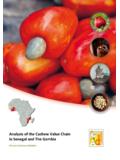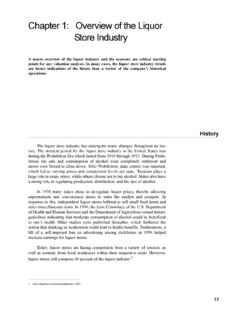Transcription of Project overview - Competitive Cashew initiative (ComCashew)
1 Gender competition 2012: ACi s contribution to gender equality and women s empowerment Project overview The African Cashew initiative (ACi) is made up of the four implementing partners Deutsche Gesellschaft f r Internationale Zusammenarbeit (GIZ), Fair Match Support (FMS), Technoserve and African Cashew Alliance (ACA). ACi aims at promoting the African Cashew value chain mainly through organizing and supporting Cashew producers and processors in five Project countries (Burkina Faso, Ghana, Benin, C te d Ivoire and Mozambique). It is expected that within four years (2009 to 2013), 5,500 new jobs 70% of them for women will be created in Cashew processing and that 150,000 small-scale Cashew producers will generate USD 15 million in additional income per year. Including the producers family members, the targeted number of beneficiaries amounts to million rural poor and therefore highly contributes to sustainably reducing poverty.
2 Gender within ACi: Why and what has been done so far? Looking at ACi s primary goals, one could ask why to include gender1 and women s empowerment in such a technical agricultural Project is it not just taking up valuable resources needed to show hard outcomes and results to meet donor demands? The answer is simple and can be found in the phrase The African farmer and her husband : Women play an indispensable role in agriculture, produce two thirds of the world s food and are mostly smallholder farmers ACi s main target group. Moreover, women s roles in agriculture are increasingly getting more important and due to male migration, early death, separation and divorce there is a steady rise of female-headed households. Many of these women are left behind without social and economic capital and technical know-how in agriculture and marketing. Hence, ACi is seeking to change that and empowers these disadvantaged farmers through trainings and education in good farming practices.
3 The second main aim of the Project to promote local Cashew processing also provides a chance of contributing to gender equality. Many new jobs will be created offering employment for women in deprived rural environments where very limited opportunities exist. Generating their own source of income has a major effect on household level and strengthens women s decision-making power and agency. Furthermore, ACi mainstreams gender equality along the entire African Cashew value chain and works towards equal participation of women and men in leadership and higher-paid positions. Besides mainstreaming gender within the main Project goals, ACi has implemented two more innovative and specialized initiatives for generating income and empowering women. ACi training session on beekeeping Firstly, beekeeping can be easily and effectively done alongside Cashew production. Several groups of women have been trained by beekeeping and honey harvesting specialists who practically educated them in how to establish and maintain the bee hive as well as in the harvest of the honey and the production of honey wax, body cream or juice.
4 This not only creates an independent income source for the women giving them more power in household decision-making but also increases the Cashew nut yield and quality due to the bees pollination of the trees. 1 Even if the term gender refers to both men and women, special emphasis is placed on women s empowerment as survey findings as well as the academic literature holistically agree on women s disadvantages in rural settings and agriculture the main focus area of ACi s intervention. African Cashew in itiative 32, Nortei Aba bio Str ee t Airpo r R esid ential Area Accra, GHANA p + 233 302 77 41 62 f + 233 302 77 13 63 e mailto: ka w http://a fr ican cash ewal lian Implementing Partners Secondly, women have been trained in grafting and nursery management and have learnt how to grow good quality Cashew seedlings which they can use on their farms to increase yields.
5 After the initial training, nursery groups have been established. Like in beekeeping, selling the seedlings provides an additional income source for the individual and the group helping to upscale their activities. Furthermore, being a member of a grafting (or beekeeping) group brings women (and men) together and offers a space where they can gain knowledge, freely share their opinions and speak out. This opportunity is not provided in community meetings or other traditionally male-dominated groups and gatherings. Woman grafting high-quality seedlings Results: How does investing in the Cashew sector transform gender relations? Hard outcomes matter: ACi s internal Monitoring and Evaluation (M&E) system considers sex-disaggregated data in analyzing the Project s impacts. In this regard, excellent achievements have been made. As Figure 1 shows, women represent 75% of the 3,100 newly created jobs in the processing factories.
6 With regards to production, the latest rate states that currently 27% of the participants in farmer trainings are women surpassing the realistically set target of 20% - a strong success given the circumstances of prevailing male-domination in agriculture and the remarkably high total number of over 64,800 female farmers who have undergone trainings so far (Figure 2). Fig. 1: Additional jobs created in processing Fig. 2: Number of farmers trained (all Project countries) (all Project countries excluding Mozambique) However, especially with regards to gender, numbers do not tell the whole story. Therefore, ACi is carrying out a qualitative gender survey not only to examine the initiatives, upscale successes and react towards shortcomings but also to hear women s voices and perceptions, give them a form of ownership and incorporate their recommendations in our follow-up action plan.
7 The survey is ongoing in Burkina Faso; yet the first inquiry in Ghana shows good results. It was recognized that the gender division of labor in Cashew production is less rigid than in other agricultural activities and women have (to a lower extent however) access to resources, do the same specific activities or sell the nuts to buyers. A good example is the joint family cultivation of Cashew farms with sharing burdens. The findings also indicate that women cultivate their own farms independently and supervise hired labor. Moreover, Cashew farming provides an essential and often the only source of income for marginalized female-headed households. Women also benefit from ACi s efforts to strengthen farmer-based organizations where women are represented equally, are however not given the top leadership positions. Lastly, as the box below illustrates, ACi facilitates a snowball effect responsible for learning and knowledge-sharing amongst women.
8 01000200030004000 Additional jobs createdThereof for women planned050,000100,000150,000200,000250,0 00300,000 PlannedActualPlannedActualPlannedActualP lannedActualPlannedActualPlannedActualPl annedActualPlannedActualDec 09 Jun 10 Dec 10 Jun 11 Dec 11 Jun 12 Dec 12 Jun 13 Male Female African Cashew in itiative 32, Nortei Aba bio Str ee t Airpo r R esid ential Area Accra, GHANA p + 233 302 77 41 62 f + 233 302 77 13 63 e mailto: ka w http://a fr ican cash ewal lian Implementing Partners Box 1. Abena the trainer: Sustainable local dissemination of Cashew farming knowledge Abena lives in the town of Busunya in Ghana s Brong-Ahafo region where she was able to attend several ACi-trainings on good Cashew farming practices. Her friends and relatives from more remote villages however were not that lucky and could not take part due to high transport costs. As Abena has benefitted from the trainings, she decided to give something back.
9 Whenever she travels to remote communities to visit her friends and family, she now carries the leaflets and materials which she received during the trainings and disseminates what she has learned, for example how to prune the trees or to establish a fire belt. She teaches them practically, goes to their farm and shows the pictures in the leaflets for example on how to properly nurse the Cashew seedlings and how to distinguish between good and bad seeds. Abena even calls her trainees when it is time to spray or to collect the nuts. But not only her fellow Cashew farmers benefit as Abena tells us: I get to travel a lot and can learn new things in Cashew farming that I did not know before. Also, every time I get gifts such as rice and yam for my efforts . Abena gains fame through her trainings and is also respected by male farmers who request her experience and are made aware of women s high capabilities.
10 ACi s intervention has empowered Abena and has facilitated the sustainable snowball effect : Extension agents teach farmers who in turn disseminate their knowledge to other farmers and family members. Also in terms of processing, ACi s efforts show good impacts regarding gender equality. Creating new and much needed employment opportunities in remote areas for deprived women (low education, limited access to land, lack of agency) gives women their own income source and a stronger voice in household decision-making. This has had a positive effect on alleviating poverty and enhancing the development of future generations. These women spend most of their income more usefully and sustainably to cater for the food and educational needs of their children. In addition, interviewed women stated that they see their employment often as a long-term opportunity since they feel comfortable and respected in the Cashew processing factories.





